#neurodiversity in fiction
Explore tagged Tumblr posts
Text
Should All Writers Have Neurodivergent Characters? Part 1
I’d argue that since life is full of neurodivergent people, fiction ought to be as well. We seem to be in a transitional time in the literary world: in the last 10-15 years, an increasing number of neurodivergent and disabled authors have written characters with the same conditions or differences that they have. Alongside this boom in fiction, we have countless YouTubers, podcasters, bloggers,…

View On WordPress
#ableism in media#disability representation#how to write#Media Representation#neurodivergent characters#neurodiversity#neurodiversity in fiction#neurodiversity in media#writing life
2 notes
·
View notes
Text
Free Book Chat and SEEDs for Autism Fundraiser
I’ll be discussing the relevance of neurodiverse characters in historical fiction at SEEDs for Autism in Phoenix on Saturday, August 12, 2023, at 11:00 a.m. The Historical Novel Society – Arizona Chapter (HNS-AZ) is partnering with SEEDs to host the free public event for anyone who appreciates historical fiction. Both readers and writers will find something of interest in the presentation,…
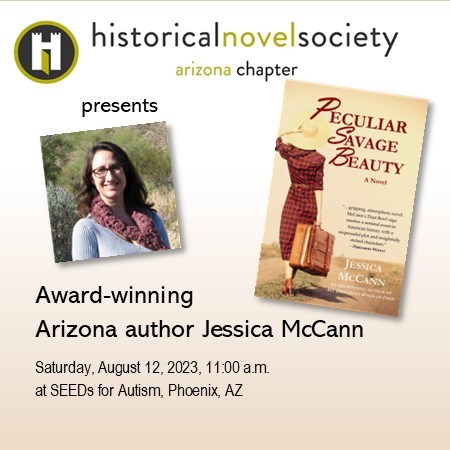
View On WordPress
#austismawareness#book recommendations#Events#historical fiction#Jessica McCann#neurodiversity in fiction#novelist#Peculiar Savage Beauty#writing tips
0 notes
Text
Okay, well, I was planning to build up some hype, but
🦇🎃HAPPY HALLOWEEN🎃🦇
Lorehaven Bound: A Hunger Pangs Short is now available on Amazon.
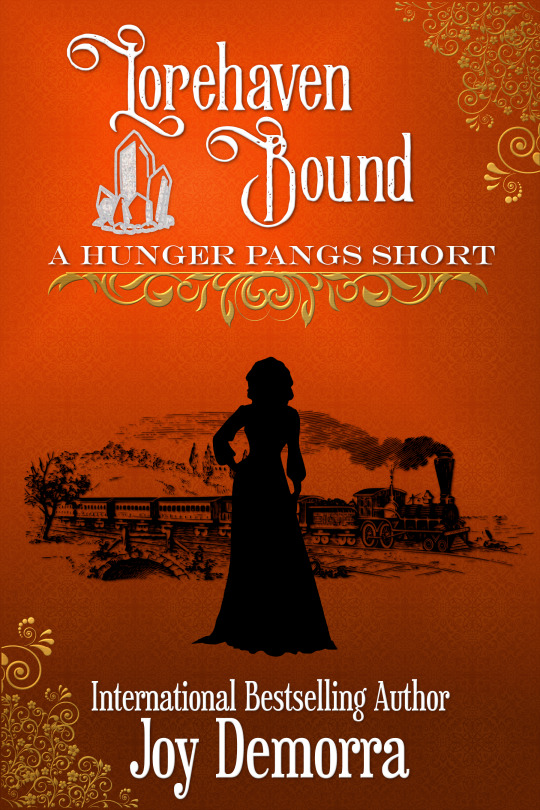
A train ride through the Nevrondian countryside should be a calming proposition, but for Ursula, it isn't. Her thoughts swirl, fixated on one thing... make that two things. Specifically Nathan Northland and Vlad Blutstein. It's not just because they are both breath-stealingly attractive—although to be fair, that doesn't hurt. It's because they surprised her, and Ursula is very rarely surprised.
Even more confounding is her reaction to them, particularly the vampire, Vlad. Just what is she supposed to do about these... feelings?
All Ursula knows is that she doesn't have time for emotions right now. Not when the fate of the world is at stake. She can deal with this later. First, she's got to figure out what story she's going to tell the sure-to-be-furious Alfbern. Then, she needs to catch up on all the sleep she missed before hitting the road again. Surely, she can do those things while being Lorehaven Bound.
*
This story is a 10,000-word character study/missing moment that takes place immediately after Hunger Pangs: True Love Bites. You will want to read that first if you don't want to be spoiled for the events in that book!
---
💖 Available now on Amazon
💖 Apple, Kobo, Smashwords, and more... (links still populating.)
💖Payhip - my personal storefront 💖
Happy reading!
Okay, thanks, love you all, bye.
ID: A red book cover showing a feminine figure standing in front of a steam strain. The title reads Lorehaven Bound, A Hunger Pangs short by International Bestselling Author Joy Demorra. There is a glittery crystal next to the text, and gold decorative swirls adorn the corners.
#Hunger Pangs series#Hunger Pangs: True Love Bites#Phangs#Joy Demorra#booklr#LGBT romance#LGBT fiction#queer fiction#queer romance#fantasy gaslamp romance#bisexual romance#LGBT fantasy#queer fantasy#paranormal romance#shifter romance#neurodiverse rep#indie author#own voices#authors of Tumblr#buy links#affiliate links#no romance in this one#just a lot of unexpected pining and blushing#and realizing you might have a crush on a vampire
1K notes
·
View notes
Text
*It's never been confirmed in canon means it's unclear / it's never been explicitly stated by the studios or the actor if the character really is neurodivergent in canon, but they could very likely be neurodivergent from their behaviors (so it’s just never been confirmed).
This request was sent to us and we made a poll in response to it. Send any Blorbo-related question you want to our inbox and we’ll make a poll on which people can vote with their own Blorbos in minds
#blorbo#comfort character#poll#polls#fandom#fandoms#fictional characters#neurodivergent#fun polls#random polls#poll time#incognito polls#tumblr polls#tumblr poll#games#game#neurodiversity
171 notes
·
View notes
Text
Originally inspired as a response to some posts by @banrionceallach and @marlynnofmany. Polished it up and decided it would make a good start to my lil story blog. Enjoy!
Not Our Usual Passengers
“What do you mean, there’s something wrong with the engines?” Captain El'ek'tak said incredulously. “You’re not an engineer, none of you humans are. You’re not even crew, you’re passengers! How dare you claim there’s something wrong with my vessel!?”
The outraged captain puffed up her air sacks, the feathery amphibian inflating as she stared down the trio of humans who had been travelling with them for the past week. They were not what she had come to expect when transporting humans, not one bit.
They were quiet, for a start. One of them didn’t even speak at all, just made an occasional tuneless humming sound when they were concentrating particularly hard on something. That was usually accompanied by a rocking back and forth that seemed remarkably similar to the Ke'tek autonomic stimulation ritual of focus.
Humans weren’t supposed to do that, were they?
The second of the human party cleared their throat softly - something they always did before speaking, which was quite a rare occurrence. The captain appreciated this, actually. So many humans she had transported interrupted her, or spoke over each other. The disrespect was really quite remarkable - but these humans waited patiently for others to finish, and this particular human’s throat-clearing was used similarly to the way El'ek'tak’s own species rustled their dorsal feathers to indicate their intent to communicate.
“Captain, apologies if we caused any offence,” at this the non-speaking human’s eyes widened in surprise, and they shook their head, clearly agreeing in a profoundly apologetic manner, without words. Their apologetic companion went on, “We can’t be certain there’s something wrong with the ship, we just thought you should know that it sounds wrong.”
The first human spoke again, nodding as they added to their companion’s statement.
“Yes, I am sorry, I didn’t mean to assert certainty when I should have stated a suspicion,” they gave a short smile, then their face quickly fell back into a neutral expression. The captain was a little taken aback by this, as that particular human seemed to very rarely express facially - quite the opposite to what she was used to with humans. It was a little disconcerting, but mostly because she had put a lot of effort into learning about human non-verbal communication.
She blinked, and stared at the three for a long moment. “It sounds wrong?” she repeated back, surprised. She had heard of some particularly sensitive species being able to diagnose certain engine issues from the vibrational frequencies, but usually this required extremely highly trained specialists.
The silent human nodded, and raised a handheld device, tapping something onto its screen for a few moments. The other two humans turned and waited patiently as their friend worked, and the Captain watched with a raised eyebrow (this wasn’t a natural Girurian expression. She had learnt it from her human studies, enjoyed how it felt, and how it could communicate so many things at once).
The human held up the device, and it emitted a gentle, slightly robotic tone, “Engine pitch changed one point five hours ago. Rising quarter octave every seven minutes. Hurt very bad fifty five minutes ago.”
Captain El'ek'tak stared for a moment at the human, her feathers rustling vaguely, as she tried to figure out a response. She looked between all three of them. “You can hear the engines, from your quarters half way across the ship?” she asked incredulously.
The most vocal of the humans spoke, while the throat-clearer nodded and the non-verbal one tapped on their device. “Oh yes,” they said, “we’re all sensitive to sensory input, at least for humans. Not a patch on Alirians sound sensitivity, or Hynoids electromagnetic spectral range, or the scent capabilities of the Teraxids - did you know they can smell a single smoke particulate in a standard atmospheric volume of 500 cubic metres?”
The human with the device gently put a hand on the speaker’s shoulder and smiled softly at their friend - who turned bright red and looked at the floor. “Sorry, xenobiological sensory discrepancies is my special interest right now,” they said, before taking a slight step back. It was at this point that the captain noticed that they were fiddling with a strange cube in their left hand, suddenly speeding up how they manipulated the piece of plastic, changing its configuration rapidly. It was a fascinating display of manual dexterity, and considered asking about it for a moment.
“Engine makes the whole ship vibrate. Can hear it any place,” spoke the little device, for it’s human, interrupting the captain's curiosity. The human’s head rose, making eye contact with El'ek'tak. The human’s gaze was intense - more so than even the other humans the captain had encountered. Eye contact was so rarely a positive thing, across a wide variety of species, but with humans she had met so far it had always been considered important. So the captain had learned to look them in the eyes. It had been a surprise when this group avoided it so much, rarely meeting her gaze for more than a split second. Early in the voyage, they had politely explained that all of them found it hard, and that they hoped she wouldn’t take offence. Frankly, El'ek'tak had been a little relieved, as all the eye contact with others of the odd little species had been quite exhausting.
But right now, the diminutive human who never spoke and could apparently tell when engines changed pitch, was looking into her eyes, and the Captain could practically feel this little traveller’s distress. It made her ankle feathers itch, and she was surprised to find herself understanding quite so much from just a look.
The captain nodded, and broke eye contact. The human looked down again, reverting back to their usual slightly-bowed stance.
“Let me check with engineering,” she said, and turned to the panel by her side, tapping a screen to raise the engine-room. Slipping comfortably into her own language, she greeted the pair of engineering crew on duty, and asked them about the state of the engines, particularly frequency or oscillation-related issues. She gave them the time to check on it, waiting silently, still as a statue, while the humans figeted, or rocked gently side to side. Their motion made her a little uncomfortable, but she had learnt that with these three, continuous movement wasn’t a sign of impatience, as it has been for many previous human passengers.
After a few minutes, the engineers returned to the screen, and exchanged a few explanatory sentences with the Captain, before tapping fingers to their foreheads respectfully. The Captain returned the gesture, and ended the call.
El'ek'tak turned back to the humans, to see that the non-verbal one was already tapping on their device. She couldn’t help but rustle her feathers, wanting to reassure the humans, but not wanting to interrupt this overt preparation for communication. The throat-clearing human raised a finger briefly, a clear request for a moment of time, and the Captain found herself surprised again at how wide a variety of perception these humans could contain within a single species.
“Pitch dropping rapidly. Expect normal range in four minutes. Thank you, captain,” said the device, as the human beamed a broad smile at her for just a brief moment.
El'ek'tak’s feathers rustled briskly, and then she replied. “Yes, that’s alright, thank you for bringing it to our attention,” she said, pausing to gather her wits. “The interphasic array had become slightly misaligned. It wouldn’t have been detected by our sensors for another hour, and then we would have had to pause the engines to manually readjust it. Catching it this early, we could simply vary the input parameters to re-compensate, and bring it back into synchronisation,” she explained, relaying the gratitude of her engineering crew.
The most vocal human flapped their hands back and forth vigorously, grinning with delight. “Oh, thank goodness, I’m so glad we could help, and that the engine noise will at least be consistent. We were worried it would be horrible for the whole trip, and we’d have to reconfigure our ear protection all the time! Genuinely helping out the engineers is so great!”
The captain’s eyes bulged with happiness, quite unable to resist the infectious joy of the gleeful human. “I am glad your trip will be more comfortable, and I will pass on how helpful you were to Central, once we reach our destination.”
The throat-clearing human, who had so consistently noticed the captain’s non-verbal communication, smiled too. They actually chuckled a little as they said, “More neurodiversity stuff to go in The Guide To Interstellar Travel With Humans,” seeming pleasantly amused.
El'ek'tak winced in embarrassment. She had already sent in three amendments to the guide regarding natural variations in human cognitive capabilities and behavioural norms since they had left Alpha Centauri, the two weeks of travel offering surprise after surprise from these passengers. But as far as she knew, the guide wasn’t acknowledged by humans - she didn’t even know the species was aware of the now rather sizeable volume of collected knowledge. It certainly wasn’t available in any human languages that she knew of - after all, what would be the point?
The human’s chuckle became gentler, and the other vocal one of the group raised a hand in an extremely close mimic of the Girurian comforting gesture - as close as could be with the wrong number of digits, anyway. The Captain couldn’t help but relax, the effort the human put into the gesture only adding to the positive impact. They flashed another brief smile as their companion explained, “Don’t worry captain. Most of us don’t bother with it, but I find it fascinating. It has been wonderful seeing the updates since our trip began. Please, the more human neurodivergency is documented, the easier space travel can be for people like us.”
There were a few more polite exchanges, during which the captain learned that the strange device she had notice was an 'infinity cube,' which was apparently a kind of 'fidget toy.' Then the humans left her ready room; a quiet, somewhat surreal collection of beings who had rather put a lie to the notion that humans were uniformly capable of being brash and difficult to deal with.
But they certainly didn’t do anything to diminish the captain’s view of humanity as a species eternally full of surprises.
#earth is space australia#humans are weird#humans are space orcs#short story#short fiction#autism#neurodiversity#neurodiversity in space#science fiction#scifi#fae papercuts original
296 notes
·
View notes
Text
Non-verbal & non-speaking characters in Audio Dramas

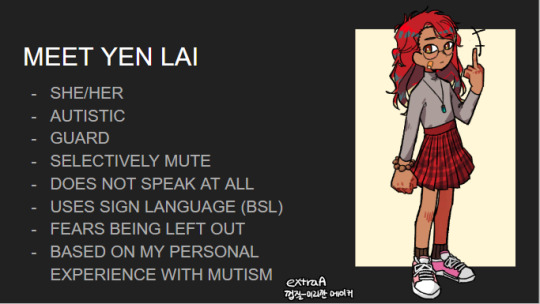
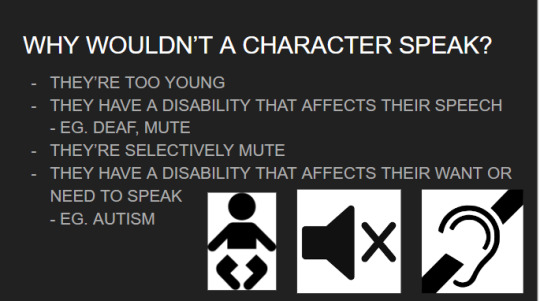

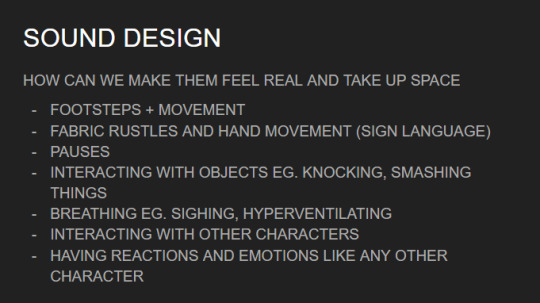
A PowerPoint was created after receiving questions as to how we could have characters that don't speak in our show. For an audio version, check our TikTok.
Suggestions for other ways to give non-speaking characters space in shows are welcome! This presentation was made by someone who is mostly non-verbal and previously fully non-speaking.
#non verbal#disabled#disability awareness#actually autistic#autism awareness#podcast#audio drama#queer horror#indie podcast#lgbtq#lgbt fiction#horror#indie#surreal horror#audio fiction#autism#audio#neurodiverse artist#neurodivergent#neurodiverse stuff#neurospicy#non speaking#nonverbal#adhd#executive dysfunction#autistic burnout#powerpoint#presentation#disabled characters#neurodivergent characters
591 notes
·
View notes
Text










Henry Bemis from The Twilight Zone 's 1959 Episode "Time Enough At Last" is autistic-coded (before autism was even a discussed and understood diagnosis): the gifset
People always talk about the protagonist of the original series episode "Minitature" being autistic-coded, but what about Henry Bemis, the protagonist from one of the most famous, if not the most famous, episodes? I've always felt a lot of sympathy with him, despite other people finding him awfully unlikable - including even other fans of the show.
As an autistic person myself, I can see some of myself in him, too, including the rather grim measures he is at one point considering going to, once he is all alone in the world... as the unfortunate reality is that autism can be a terribly lonely and alienating neurodivergency, and there is therefore a disturbingly high rate of suicide among autistics. As much as I love celebrating autistic joy, acknowledging our unique struggles is of paramount importance, too.
#henry bemis#time enough at last#autism in fiction#neurodiversity#twilight zone original series#the twilight zone#old sci fi#autism headcanons#autistic coded characters#suicidal imagery cw#suicide mention
82 notes
·
View notes
Text
"Truth is, people are as fluid as time is. We adapt to our situation like water in a strangely shaped jug, though it might take us a little while to ooze into all the little nooks. Because we adapt, we sometimes don’t recognize how twisted, uncomfortable, or downright wrong the container is that we’ve been told to inhabit.
We can keep going that way for a while. We can pretend we fit that jug, awkward nooks and all. But the longer we do, the worse it gets. The more it wears on us. The more exhausted we become. Even if we’re doing nothing at all, because simply holding the shape can take all the effort in the world. More, if we want to make it look natural."
- Brandon Sanderson, Tress of the Emerald Sea
#dark academia#books#neurodivergent#Masking#tress of the emerald sea#Trauma#neurodiversity#brandon sanderson#Book quote#Fantasy#science fiction#Burnout
49 notes
·
View notes
Text
This trailer is best experienced with headphones. For adult audiences only. Content warning for gun violence, violence & gore, explicit language, smoking.
WE HAVE NOW OFFICIALLY PREMIERED!
If you're into queer & BIPOC stories, modern fantasy, mythologies, epic romances, intense drama, and found family - you might enjoy KIND!
Sujin Baek is a happily married cook and caretaker for the children at Eden Orphanage. He is also the Kind Killer, Silver City's most prolific and terrifying serial killer. When his secret is forced to the surface, the city's dark underbelly threatens the very heart and humanity of all Silverians.
RSS: https://feeds.acast.com/public/shows/66399aa455607b00122797ee
Spotify: https://open.spotify.com/show/3LCDFg6qQpPlGnW87Adyw1
Podlink: https://pod.link/1745264975
YouTube: https://www.youtube.com/channel/UCj6i5MHmFz6wI1XV0Y8hlNg
Apple Podcast: https://podcasts.apple.com/us/podcast/kind-an-lgbtq-mythical-noir-audio-drama/id1745264975
#audio drama#podcast#audiodrama#fiction podcast#new audio drama#audio fiction#queer community#new podcast#queer#lgbt#lgbtq community#lgbtq#trailer#sapphic#gay#wlw#queer characters#bipoc#bipoc characters#bipoc creatives#neurodiversity#neurodivergent#cw: smoking#cw: gore#cw: guns#kind: an lgbtq+ mythical noir audio drama#strangekindstudio#IT'S HERE OMG WE'RE LIIIIVE#WE ARE REAL#ITS HAPPENING
40 notes
·
View notes
Text
Yes, You CAN Write Neurodivergent Characters
A companion to the post Should All Writers Have Neurodivergent Characters?, in which I discussed the mountains of research, storyline alterations, and ethical qualms writers may face when they consider writing fiction with neurodivergent characters. While these are valid concerns, I know that many writers still want to create NCs (neurodivergent characters). Maybe they’re neuro-spicy themselves,…
#how to write neurodivergent characters#neurodivergent characters#neurodiversity#neurodiversity in fiction
0 notes
Text
When I say I'm in a spectrum, this is what I mean:

They are me. I'm them.
🎨: lemntii on IG
🎨: Arthur Hughes
#girlhood is a spectrum#fictional characters#iltsm#anne shirley#francesca bridgerton#elain archeron#helaena targaryen#ophelia#cecilia lisbon#the witch#carrie white#neurodiversity
25 notes
·
View notes
Text

Silver in the Ashes (Argentum in Aqua #2): Chapter 73
No smoke without fire
In which the ritual proper begins, and Archer finally admits the truth
(New to the story? Start here)
(No idea what this is, but interested/intrigued? Go here)
Patreon | Ko-fi
#argentum in aqua#silver in the ashes#gaslamp fantasy#original novel#webnovel#lgbtq fiction#lgbtq fantasy#writeblr#creative writing#web serial#original writing#writing#booklr#writerblr#lgbt fiction#queer fiction#lgbt fantasy#queer fantasy#disability rep#neurodiverse rep#indie author#own voices#authors of Tumblr#transmasc rep#transmasc mc#bi mc#bi rep#lesbian mc#lesbian rep
12 notes
·
View notes
Text
Hunger Pangs: True Love Bites

In a world of dwindling hope, love has never mattered more...
Captain Nathan J. Northland had no idea what to expect when he returned home to Lorehaven injured from war, but it certainly wasn’t to find himself posted on an island full of vampires. An island whose local vampire dandy lord causes Nathan to feel strange things he’d never felt before. Particularly about fangs.
When Vlad Blutstein agreed to hire Nathan as Captain of the Eyrie Guard, he hadn’t been sure what to expect either, but it certainly hadn’t been to fall in love with a disabled werewolf. However Vlad has fallen and fallen hard, and that’s the problem.
Torn by their allegiances–to family, to duty, and the age-old enmity between vampires and werewolves–the pair find themselves in a difficult situation: to love where the heart wants or to follow where expectation demands.
The situation is complicated further when a mysterious and beguiling figure known only as Lady Ursula crashes into their lives, bringing with her dark omens of death, doom, and destruction in her wake.
And a desperate plea for help neither of them can ignore.
Hunger Pangs: True Love Bites by Joy Demorra is a queer, paranormal, gaslamp fantasy romance novel featuring enchanted forests, gothic castles, and just a smidge of industrial coal dust, and is the first book of the Hunger Pangs slow-burn polyamorous romance series. Join Vlad, Nathan, and Ursula as they navigate a magical world torn asunder war and politics as they work to restore balance to the world and find love along the way. Book one is available now in ebook, paperback, and audio.
Buy the (high heat) Flirting With Fangs Edition Here.
Buy the (medium heat) Fluff and Fangs Edition Here.
Why are there two versions, and what's the difference between them? Glad you asked! You can also check out individual content tags and heat ratings on my website at www.joydemorra.com
#Hunger Pangs: True Love Bites#Phangs#Joy Demorra#booklr#writerblr#LGBT romance#LGBT fiction#queer fiction#queer romance#fantasy gaslamp romance#bisexual romance#LGBT fantasy#queer fantasy#paranormal romance#shifter romance#disability rep#neurodiverse rep#indie author#own voices#authors of Tumblr#buy links#affiliate links#ID in alt#trying something new with the promos#don't mind me
1K notes
·
View notes
Note
Is Jane neurodivergent? Is that why she hyperfixates on minor details like the ominous cushions? I just get like that when I'm stressed out, so I was wondering.

Yes, Jane IS neurodivergent! Her reactions to the world are often “different” from what other people expect… and we are grateful that many of our players identified with that part of Jane! We (Emily and Tanya) are the two main developers of Save the Villainess and we too are neurodivergent! So when we developed Jane, we wanted to have her behave in ways that might make her seem ridiculous and worthy of destroying… but also allow her to stop assassination attempts by being both clever and unpredictable. Ultimately, Save the Villainess is a about a neurodivergent Woman of Color who survives by thinking differently. So if you are someone who thinks in unusual ways to survive pain… We see you in Save the Villainess… and we hope you can see yourself too.
#jane neville#save the villainess#savethevillainess#otome game#visual novel#english otome#villainess#amare game#villainess isekai#isekai#dating sim#dating game#neurodivergent#neurodiversity#neurodivergence#neurospicy#interactive fiction#interactive game#otome isekai#otome romance#otome#strong female character#strong female lead#strong female protagonist#neurodivergent female lead
30 notes
·
View notes
Text
Autism (and possible ADHD) headcanon: Alice (Alice's Adventures in Wonderland/Through the Looking-Glass)

This analysis is based on the books, but most of it applies to Disney's Alice too.
Now of course she wasn't written with either autism or ADHD in mind: no concept of either existed when the books were written. Some people might argue that all the "evidence" below is just her being a seven-year-old child. But all these qualities make her relatable to neurodivergent people, and whose to say that she wouldn't be diagnosed as neurodivergent if she were a real person and lived today?
Autism evidence
*Alice is a very inward little girl. Not only do both books literally take place mostly in her mind, but even within her dreams she's constantly thinking, daydreaming, analyzing, and imagining things. She sometimes gets so lost in her thoughts and fantasies that she forgets all about what's currently happening, or about the other characters, and they sometimes notice this (e.g. "You're thinking about something, my dear, and that makes you forget to talk.").
*She constantly talks to herself and pretends to be two people.
*In what little we see of her life in the real world, she's never shown playing with children her own age. She's content to play by herself, talking to her kittens, creating elaborate fantasies, or even playing a game of croquet against herself.
*She's precocious and smart, with a good (though imperfect) memory for facts she's learned in school, and she likes to show off her knowledge, both to others and to herself. She knows many "grand words" that other children her age don't know (e.g. "latitude," "longitude," "jurors"), and she enjoys saying them out loud, even when she doesn't know what they mean. In Wonderland, when she tries to recite the lessons and poems she's memorized and finds herself comically mangling them, her core sense of self is shaken.
*Despite being sane and sensible compared to the fantasy characters she meets, Alice is more than a little eccentric herself. She constantly daydreams and talks to herself, as mentioned. She comes up with outlandish fantasies, like mailing Christmas presents to her own feet, or that different foods change people's temperaments, or that people in New Zealand and Australia walk upside-down. Her confusing experiences in Wonderland make her wonder if she's still Alice or if she's become a different person. The fact that her adventures in Wonderland and Looking-Glass Land are dreams make her seem all the more eccentric in hindsight: those two fantasy worlds and all the strange things in them are creations of Alice's own mind.
*Even though she tries to always be proper and polite, she sometimes makes offensive remarks without meaning to. For example, when she praises her cat Dinah's skill at catching mice and birds in front of a mouse and group of birds, or when she calls three inches "a wretched height" while talking to a three-inch caterpillar. She also throws manners aside and talks back to adults whenever she thinks they're being especially rude or unreasonable.
*She often seems to imitate the adults in her life. When she remembers to check the "Drink Me" bottle and make sure it's not marked "poison," or when she scolds herself for crying or for lolling on the grass, she's clearly parroting what she's heard from adults. Likewise, when she scolds the pig-baby for grunting, or her kitten for all its mischief and "bad manners," she's obviously affecting a tone that adults have taken with her. All the scolding and correcting she does, especially to herself, might also imply that she's a child who's been scolded and corrected especially often.
*She's often described as speaking "shyly" or "timidly" – though as mentioned, she can be bold to the point of impertinence when she's pushed far enough.
*She dislikes books without pictures, and she can make no sense of the poem Jabberwocky – even though its plot is easy for most real-world readers to follow – because there are too many made-up words in it. Now, these don't necessarily imply that she has trouble with reading comprehension, but they might.
*One throw-away line in Through the Looking-Glass implies that she's a picky eater. When she brings up the subject of having to go without meals as punishment, she says she would rather go without them than eat them anyway.
*She's particularly annoyed by certain small noises and sensations – like Bill the Lizard's pencil squeaking at the trial in the first book, or the Gnat's tiny sigh that tickles her ear in the second.
*Both stories consist of her wandering through nonsense worlds, being baffled by their strange rules and customs, and being ordered around, corrected, and judged negatively by the strange creatures she meets, just because her logic is different from theirs. For those of us on the autism spectrum, this is a relatable experience.
ADHD evidence
*She tends to be impulsive, particularly in the first book. For example, she goes down the rabbit hole without thinking of how she'll ever get out again, and later drinks the potion in the White Rabbit's house without knowing if it will make her grow or shrink just because she's anxious for some change in her size. This isn't a matter of not knowing better – she sometimes tells herself what she should do, only to act on her impulses anyway. Or, in other words, she gives herself very good advice, but she very seldom follows it.
*She can be verbally impulsive too: for example, her careless remarks about Dinah catching mice and birds.
*She's prone to daydreaming, as mentioned above.
*She sometimes has trouble controlling her emotions, most memorably when she cries a big pool of tears after growing to the size of a giant. She tells herself she should be ashamed for crying so much, but she can't stop.
*She can be easily distracted, especially by her own imagination, and in the first chapter of Through the Looking-Glass, she flits from subject to subject while talking to her kitten.
*She's easily bored and always in search (literally or figuratively) of some new adventure or amusement. One of the things she most dislikes is "having nothing to do."
#autism headcanon#adhd headcanon#alice#alice's adventures in wonderland#through the looking glass#alice in wonderland#autism#adhd#audhd#neurodiversity#headcanon#fictional characters
64 notes
·
View notes
Text
Normal Quizzes for Normal People
I got g̷̪̻̦͑̒r̵̡̳̊̈́͆͂̈̇ͅȩ̶̲̞̫̼̼̤̪̈́͐̃̓͛͋ȩ̴̛̳̜͕̯̟̗͋͌͊̅̅̊͝͝ͅņ̷͇̮̮͔͕̊̒̆̆̚͝

#lgbt#lgbtq#lgbtqia#lgbtq+#queer#mental health#coping#anxiety#ocd#adhd#autism#neurodivergent#neurodiversity#uquiz#uquiz quiz#uquiz link#quizzes#personality quiz#what color are you#what color are you quiz#ao3#ao3 fanfic#fanfic#ao3 writer#fan fiction#archive of our own#fanfiction
24 notes
·
View notes